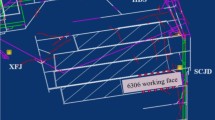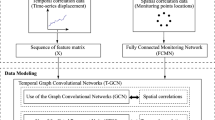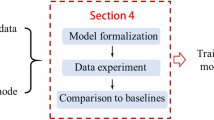Abstract
The pressure prediction technology whereby represents the rock pressure law in the excavation is fundamental to safety in production and industrial intelligentization. A growing number of researchers dedicate that machine learning is used to accurate prediction of underground pressure changes. However, the existing research which based on the classical machine learning rarely considers the cause between inducement of underground pressure and the underground pressure change. In this paper, we propose a novel Reinforced and Causal Graph Neural Network, namely RC-GNN, for the prediction task, to overcome the shortage of causal logic. First, we build a causal graph by considering internal relations between inducement and display of pressure and employ prior knowledge to erect the early and properties of the graph. Second, we construct the prediction network for underground pressure by graph convolutional networks and long short-term memory. Finally, we use the performance index of underground pressure prediction to design a reinforcement learning algorithm, which achieves optimization of the causal graph. Compared to six representative methods, experimental results with 18–60% increases in performance on the real prediction task.










Similar content being viewed by others
Explore related subjects
Discover the latest articles, news and stories from top researchers in related subjects.References
Song W, Cheng J, Wang W, Qin Y, Wang Z, Borowski M, Wang Y, Tukkaraja P (2021)Underground mine gas explosion accidents and prevention techniques—an overview. Arch Min Sci 66(2)
Mohanty D (2017) An overview of the geological controls in underground coal gasification. In: IOP conference series: earth and environmental science, vol 76, p 012010, IOP Publishing
Liu H, Yu H (2018) Decentralized state estimation for a large-scale spatially interconnected system. ISA Trans 74:67–76
Yu X, Han J, Shi L, Wang Y, Zhao Y (2017) Application of a bp neural network in predicting destroyed floor depth caused by underground pressure. Environ Earth Sci 76(15):1–12
Wang W, Cheng Y-P, Wang H-F, Li W, Wang L (2015) Coupled disaster-causing mechanisms of strata pressure behavior and abnormal gas emissions in underground coal extraction. Environ Earth Sci 74(9):6717–6735
Gu S, Zhang W, Jiang B, Hu C (2019) Case of rock burst danger and its prediction and prevention in tunneling and mining period at an irregular coal face. Geotech Geol Eng 37(4):2545–2564
Zhang S, Li Y, Shen B, Sun X, Gao L (2019) Effective evaluation of pressure relief drilling for reducing rock bursts and its application in underground coal mines. Int J Rock Mech Min Sci 114:7–16
Meng X, Yu H, Zhang J, Xu T, Wu H, Yan K (2022) Disturbance observer-based feedback linearization control for a quadruple-tank liquid level system. ISA Trans 122:146–162
Telichenko, V., Rimshin, V., Eremeev, V., Kurbatov, V.: Mathematical modeling of groundwaters pressure distribution in the underground structures by cylindrical form zone. In: MATEC Web of Conferences, vol. 196, p. 02025 (2018). EDP Sciences
Li Z, Wang Y, Olgun CG, Yang S, Jiao Q, Wang M (2020) Risk assessment of water inrush caused by karst cave in tunnels based on reliability and ga-bp neural network. Geomat Nat Haz Risk 11(1):1212–1232
Harp DR, O’Malley D, Yan B, Pawar R (2021) On the feasibility of using physics-informed machine learning for underground reservoir pressure management. Exp Syst Appl 178:115006
Radke D, Hessler A, Ellsworth D (2019) Firecast: leveraging deep learning to predict wildfire spread. In: IJCAI, pp 4575–4581
Alley RB, Emanuel KA, Zhang F (2019) Advances in weather prediction. Science 363(6425):342–344
Huang R, Wei C, Wang B, Yang J, Xu X, Wu S, Huang S (2021) Well performance prediction based on long short-term memory (lstm) neural network. J Petrol Sci Eng 109686
Kumar N, Kumar H (2021) A novel hybrid fuzzy time series model for prediction of covid-19 infected cases and deaths in India. ISA transactions
Reed KA, Stansfield A, Wehner M, Zarzycki C (2020) Forecasted attribution of the human influence on hurricane florence. Sci Adv 6(1):9253
Sontakke SA, Mehrjou A, Itti L, Schölkopf B (2021) Causal curiosity: Rl agents discovering self-supervised experiments for causal representation learning. In: International conference on machine learning, pp 9848–9858
Wu Z, Pan S, Long G, Jiang J, Chang X, Zhang C (2000) Connecting the dots: Multivariate time series forecasting with graph neural networks. In: Proceedings of the 26th ACM SIGKDD International Conference on Knowledge Discovery & Data Mining, pp 753–763
Wu Z, Pan S, Chen F, Long G, Zhang C, Philip SY (2020) A comprehensive survey on graph neural networks. IEEE transactions on neural networks and learning systems 32(1):4–24
Peng, H., Zhang, R., Li, S., Cao, Y., Pan, S., Yu, P.: Reinforced, incremental and cross-lingual event detection from social messages. IEEE Transactions on Pattern Analysis and Machine Intelligence (2022)
Lim B, Zohren S (2021) Time-series forecasting with deep learning: a survey. Phil Trans R Soc A 379(2194):20200209
Wang J, Li Z, Long Q, Zhang W, Song G, Shi C (2020) Learning node representations from noisy graph structures. In: 2020 IEEE international conference on data mining (ICDM), pp 1310–1315, IEEE
Wei WW (2006) Time series analysis. In: The Oxford handbook of quantitative methods in psychology: Vol 2
Deng A, Hooi B (2021) Graph neural network-based anomaly detection in multivariate time series. In: Proceedings of the AAAI conference on artificial intelligence, vol 35, pp 4027–4035
Zhu Y, Xu W, Zhang J, Liu Q, Wu S, Wang L (2021) Deep graph structure learning for robust representations: a survey. arXiv:2103.03036
Peng H, Du B, Liu M, Liu M, Ji S, Wang S, Zhang X, He L (2021) Dynamic graph convolutional network for long-term traffic flow prediction with reinforcement learning. Inf Sci 578:401–416
Peng H, Li J, Gong Q, Ning Y, Wang S, He L (2020) Motif-matching based subgraph-level attentional convolutional network for graph classification. In: Proceedings of the AAAI Conference on Artificial Intelligence, vol 34, pp 5387–5394
Xu H, Huang Y, Duan Z, Feng J, Song P (2020) Multivariate time series forecasting based on causal inference with transfer entropy and graph neural network. arXiv:2005.01185
Jin D, Huo C, Liang C, Yang L (2021) Heterogeneous graph neural network via attribute completion. In: Proceedings of the web conference 2021, pp 391–400
Abu-El-Haija S, Perozzi B, Kapoor A, Alipourfard N, Lerman K, Harutyunyan H, Ver Steeg G, Galstyan A (2019) Mixhop: Higher-order graph convolutional architectures via sparsified neighborhood mixing. In: International Conference on Machine Learning, pp 21–29, PMLR
Peng H, Zhang R, Dou Y, Yang R, Zhang J, Yu PS (2021) Reinforced neighborhood selection guided multi-relational graph neural networks. ACM Trans Inf Syst (TOIS) 40(4):1–46
Wang L (2018) Law and control of strata behavior in fully mechanized working face with shallow depth and high-intensity mining in Yushen mining area. PhD thesis, China University of Mining
Tong Z, Yixin Z, Guangpei Z, Shaolei W, Zhenhua J (2016) A multi-coupling analysis of mining-induced pressure characteristics of shallow-depth coal face in shendong mining area. J Chin Coal Soc (S2):287–296
Peng H, Li J, Wang Z, Yang R, Liu M, Zhang M, Yu P, He L (2021) Lifelong property price prediction: a case study for the toronto real estate market. IEEE Trans Knowl Data Eng (2021)
Acknowledgements
The authors of this paper are supported by the National Key R &D Program of China through Grant 2021YFB1714800, S&T Program of Hebei through Grant 20310101D. We also thank the Natural Science Foundation of Beijing Municipality through Grant 4222030.
Author information
Authors and Affiliations
Corresponding authors
Additional information
Publisher's Note
Springer Nature remains neutral with regard to jurisdictional claims in published maps and institutional affiliations.
Rights and permissions
Springer Nature or its licensor holds exclusive rights to this article under a publishing agreement with the author(s) or other rightsholder(s); author self-archiving of the accepted manuscript version of this article is solely governed by the terms of such publishing agreement and applicable law.
About this article
Cite this article
Wang, Y., Liu, M., Huang, Y. et al. Knowledge-based and data-driven underground pressure forecasting based on graph structure learning. Int. J. Mach. Learn. & Cyber. 15, 3–18 (2024). https://doi.org/10.1007/s13042-022-01650-3
Received:
Accepted:
Published:
Issue Date:
DOI: https://doi.org/10.1007/s13042-022-01650-3




